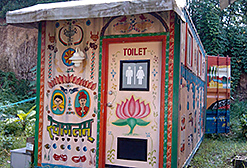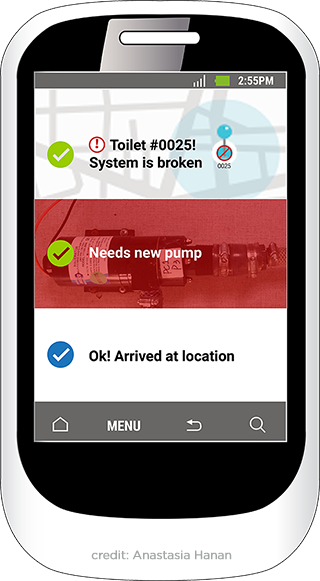
Meet Seva Sustainable Sanitation, first place winner in the 2015 Wireless Innovation Project. Based at Caltech, founders Clement Cid and Cody Finke are developing a low-cost, remote monitoring and maintenance system for sanitation facilities.
Images of open sewers are commonly used to depict one of the most challenging infrastructure issues of our time, one that’s impacting 2.5 billion people globally and has a wide-ranging impact on health, environment, and livelihood.
NGOs and government agencies have long focused on implementation of new sanitation technologies without a clear go-to strategy on monitoring and maintaining those systems. PhD students in Environmental Science and Engineering respectively, Cid and Finke noticed an opportunity in addressing the lack of cheap, efficient toilets but also the skills needed for repair and upkeep within local communities, especially in remote, rural areas.

Under the advisement of Caltech Professor Michael Hoffmann, they developed a rugged prototype of a solar-powered wastewater treatment and recycling system, which gained recognition in the Gates Foundation’s 2012 Reinvent the Toilet Challenge. Essentially, it’s an electrochemical reactor that converts human waste into disinfected water. For those near Pasadena, there is a functional template installed on the Caltech campus where visitors are more than welcome.
One challenge that the team faced as they field tested units in India, where the lack of sanitation infrastructure is acute, was a simple one… when it breaks, how do you fix it? And who exactly can fix it? The team created a solution: Seva. It combines software and sensors to detect failures, diagnose issues and provide step-by-step repair checklists to local technicians – along with location and pictures of the parts needed.
“There’s no diagnosis on the operator’s part. It’s extremely simple,” project lead, and software engineer Finke says. “And it doesn’t really matter how the part is broken, because in each case, the system is just fixed by replacing the part.”
The technician then completes the checklist and uploads the repair log, which is then backed up to the cloud. This ensures an archive of reliable and comparable data to measure against as the project progresses.
Now, Seva aspires to a Toilet 2.0 for high impact supported by the funds from the Vodafone Americas Foundation.
“We need to interface our code with inexpensive and durable electronics and sensors to build our alpha prototype. By the end of next year, this version will be implemented and tested on our Reinvented Toilet on the Caltech campus and later in India and China,” Cid explains.